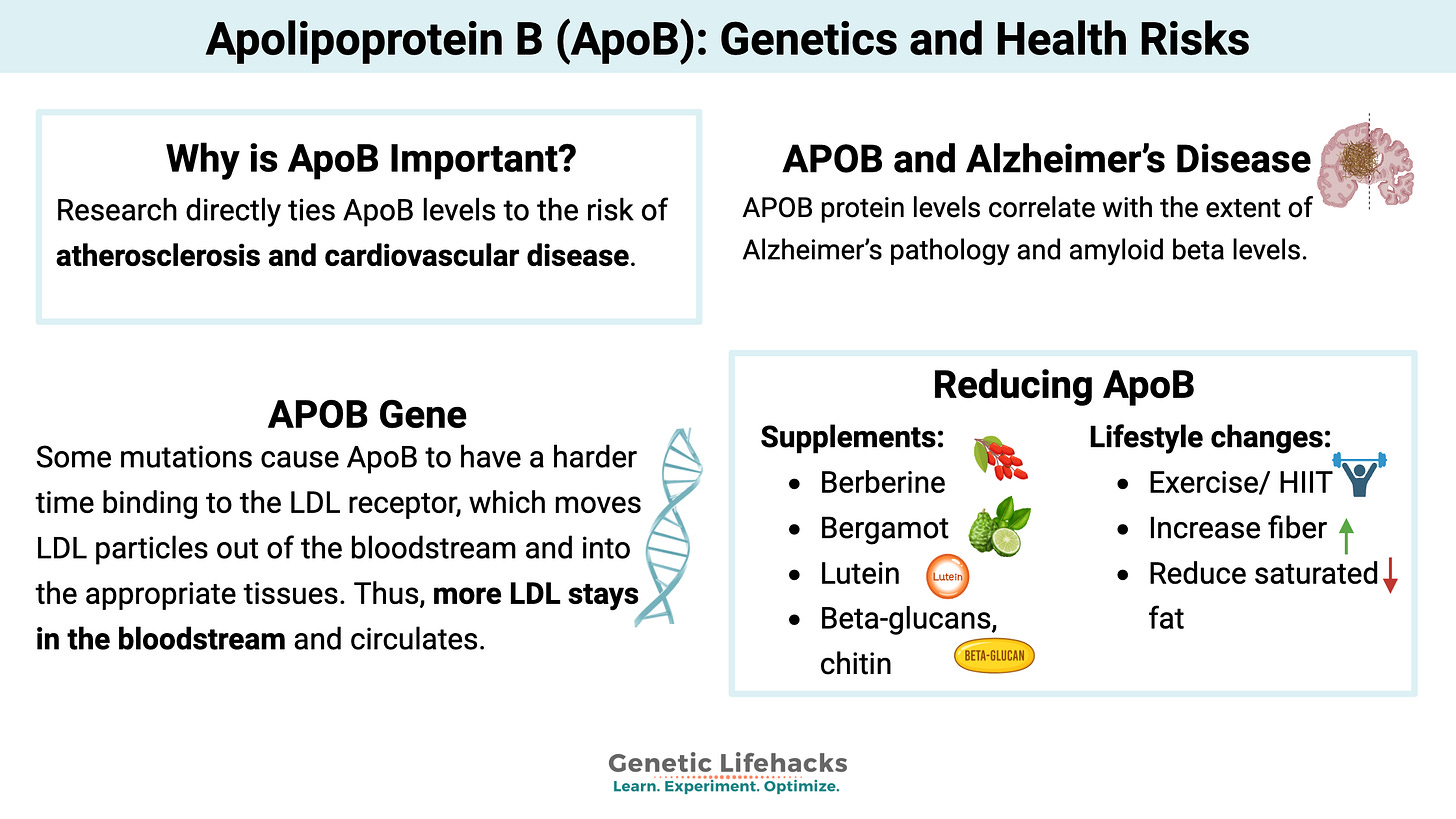APOB | Plus a new framework for longevity
ApoB and heart disease:
The latest member-requested Genetic Lifehacks article explains the role of the APOB gene and apolipoprotein B (ApoB) in cardiovascular and metabolic health. Each LDL, VLDL, and Lp(a) particle contains one ApoB—making it a direct marker of the number of circulating lipoproteins. Research now shows that ApoB is a more accurate marker of heart disease risk than traditional measures like LDL-C or total cholesterol.
ApoB levels are about 40-50% due to genetics, with diet and lifestyle also playing a big role here. Genetic variants in the APOB gene influence ApoB levels, and understanding your own genetic susceptibility (and lifestyle factors) can help you better assess your risk for heart disease.
Salutogenesis: Reversing the perspective
Salutogenesis is a framework for looking at health from the point of view of what drives resiliency rather than focusing on diseases. The idea of understanding and promoting resiliency resonates with me. I took a little time this week to finish up and publish an article on Longevity Lifehacks about salutogenesis and the research on immune resilience.
The two studies that I focused on in the article came to the conclusion that immune system resiliency was key to longevity. Essentially, have a proper immune response to pathogens and cancer, without having excess inflammation that sticks around. You can read the full salutogenesis and immune resilience article if you're interested in longevity.
The salutogenesis perspective - focusing on factors that promote health rather than stopping diseases - is one that goes beyond just looking at lifespan and healthspan. It is a framework that I'm going to try to incorporate into more articles on Genetic Lifehacks, like this one on resilience to childhood trauma.
Gratefully yours,
~ Debbie
Updated article!APOB gene: Apolipoprotein B Levels and Health Risks
Key takeaways:
~ ApoB is a protein found in LDL, VLDL, Lp(a), and chylomicrons, with one ApoB per particle.
~ ApoB is a better predictor of heart disease risk than LDL-C or total cholesterol.
~ Genetic variants can increase or decrease ApoB levels. Understanding your genetic variants can help you to prioritize diet and lifestyle factors, which also play a strong role in ApoB levels.
Read the rest of the article here
What I've been reading:
1. Prevalent mesenchymal drift in aging and disease is reversed by partial reprogramming
This is a nifty new study on partially reprogramming cells to be younger. Mesenchymal refers to the type of cells that can develop into skin cells, blood vessels, connective tissue, and adipose tissue. The study is showing that in aging, there's a drift towards loss of differentiation and cell identity, which the researchers were able to reverse.
This may be of interest to anyone in California (or able to travel there) with long Covid.
3. Transfer of IgG from Long COVID patients induces symptomology in mice
This is a preprint for a study showing that IgG from long Covid patients causes mice to have long Covid symptoms. This is likely due to autoantibodies that are triggered in different types of long Covid.




At the urging of a number of my Long Covid friends, I've begun to read "Outlive" by Attia. This book is deceptively named, I think, as it appears to really be all about salutogenesis - coming to the "live longer" theme via "delay the onset of these four leading causes of death". I just read the chapter on the heart and it has lots to say about ApoB. That chapter alone is worth a read, I think.
Another good article. You take dense information and make it clearer. Impressive.